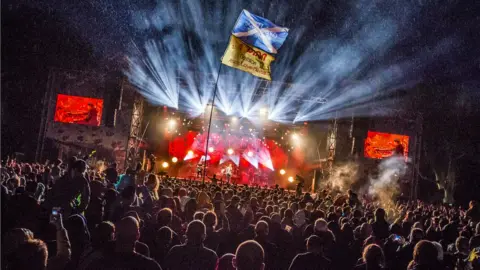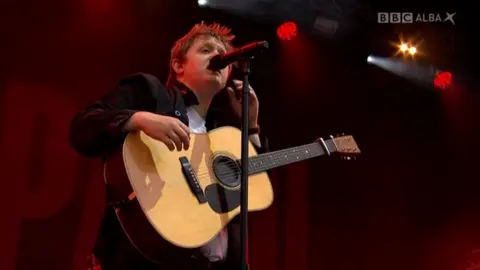How do you host a gig after a summer of no music?
 Paul Campbell
Paul CampbellWith a joyless summer devoid of concerts and music festivals looming, it may almost feel appropriate to enter a period of mourning.
Perhaps you'll smear on some heavy eyeliner. You'll dig out The Cure T-shirt you purchased on impulse last year. And yes, you may even enjoy some Black Parade without irony.
But Scotland's industry professionals have urged music fans not to despair - they say that while the landscape looks very uncertain, live entertainment will inevitably return in some shape or form.
"Even during times of recession, sometimes it hits the entertainment industry last - because people need that release," says Jonathan Dawson, general manager at SWG3 in Glasgow.
 Getty Images
Getty ImagesHe was speaking to Myles Bonnar on new BBC Scotland podcast Unlocked, alongside event manager for Belladrum Tartan Heart Festival Lesley Strang.
All of SWG3's events have been postponed or cancelled until August, though it is not known when things may return to "normal".
Meanwhile Belladrum announced last week that the 2020 festival would instead be moved to the following year, with a full refund policy in place.
But at a time when strangers must keep two metres apart, it is difficult to imagine practical measures that would allow live music events to continue.
Would reducing venue capacity be an option?
Lesley said: "We could reduce our capacity, but how do we then maintain social distancing within a festival footprint?
"There are so many parameters around that that are just impossible to deliver."
"I think we're now kind of aware that the likelihood of any kind of touring this year is slim," Jonathan added.
"I think it's nigh impossible to have a thing of high-capacity but you can't maintain physical distancing at a show.
"I don't think a reduction in capacity works for a lot of people - I could have 1,000 people and do very little on the bar. A drop of 50% is just not viable, people might not even open."
Jonathan also wondered whether it would be feasible to conduct temperature checks at the door.
But ultimately, the next step for SWG3 will be to speak to their ticket buyers to find out what it would take for them to return.
"I've spoken to some pub and club owners and some people are under the impression that it's going to be a mad stampede - I don't see that," he said.
"I've been paying a lot of attention to the Swedish model and they haven't closed down as much as we have - what's interesting is they've still seen a 70% drop in people attending."
Allow Google YouTube content?
There is also a big question mark over who will shoulder the cost if live music could return in a post-lockdown world.
Many festival organisers, like Belladrum, have given refunds to customers if they cannot make rescheduled performances - or even if they choose not to attend.
Lesley described Belladrum's plans as being "put on ice" for a year.
But in the shorter term, Jonathan believes whatever "power hierarchy" between artists, agents and promoters has ceased to exist - and as such, costs should reflect that.
He said: "There needs to be an understanding that maybe agents' fees and booking fees for DJs - that all needs to come down a wee bit.
"We need to get to a point where the ticket price coming out of this has to be lower for the customer.
"We could see a knock on effect in this for a couple of years and the focus needs to be on keeping things as cheap and accessible for the customer as possible."
'We're grieving, but we'll adapt'
In lieu of live performances, many artists have reached out to fans online.
Pop stars like Chris Martin and Gary Barlow have set up intimate jamming sessions while Radiohead is streaming one of its concerts for free every week until lockdown ends.
For event organisers, it's unlikely that social media could replicate the feelings of a concert - although Lesley says Belladrum "is exploring being part of a bigger thing that might happen in the UK".
The only thing that's certain is uncertainty, which prompts the question - will live music ever be the same again?
Lesley said: "We couldn't see a situation at the moment where people would be able to come, get drunk [and enjoy] human behaviour.
"I would like to think we'll get to a place where it will be safe to gather in groups. We perhaps have to think about our hygiene a bit more but for us, we're still a long, long way away from what we would call normal."
 BBC Alba
BBC AlbaLike many other music fans, Jonathan realised he had been "grieving" - both for the life that he had and for the future.
But he believes that the spirit of music is an embodiment of human nature and its ability to evolve. As a result he believes "entertainment will come back".
He said: "We're humans, by nature we adapt to absolutely everything. Things might not be the same but that doesn't necessarily mean they're all going to be negative.
"It's really important to remember there's going to be an opportunity, especially for event organisers, concerts and entertainment. It's shown over time that's such an amazing release for people.
"It might be a slow process. We don't have answers now, but we'll get there."
Unlocked is a new BBC Scotland podcast in which Myles Bonnar unearths stories from locked-down life each week - offering new takes on the stuff that matters to young adults.
The first episode is available on BBC Sounds from 1 May.
